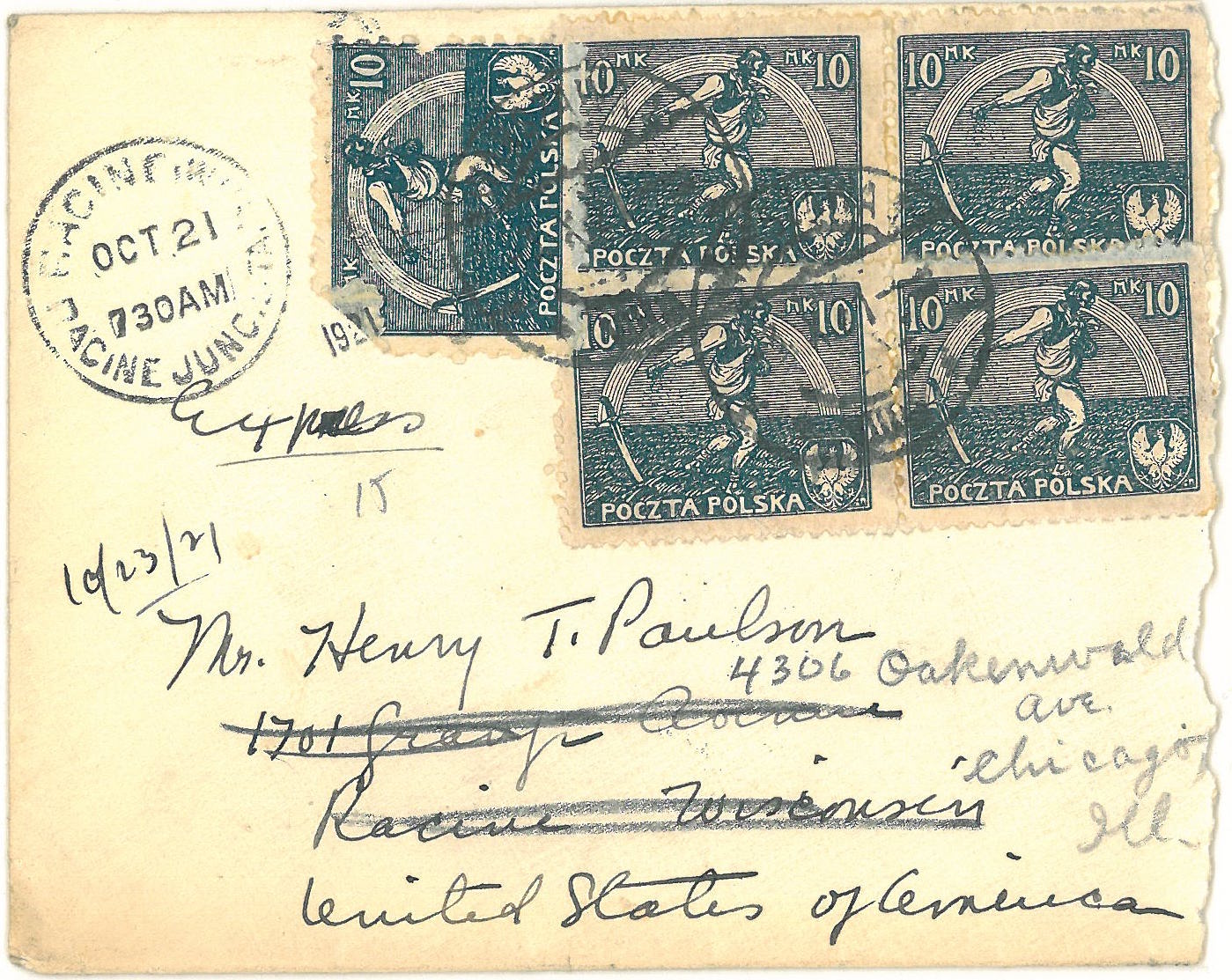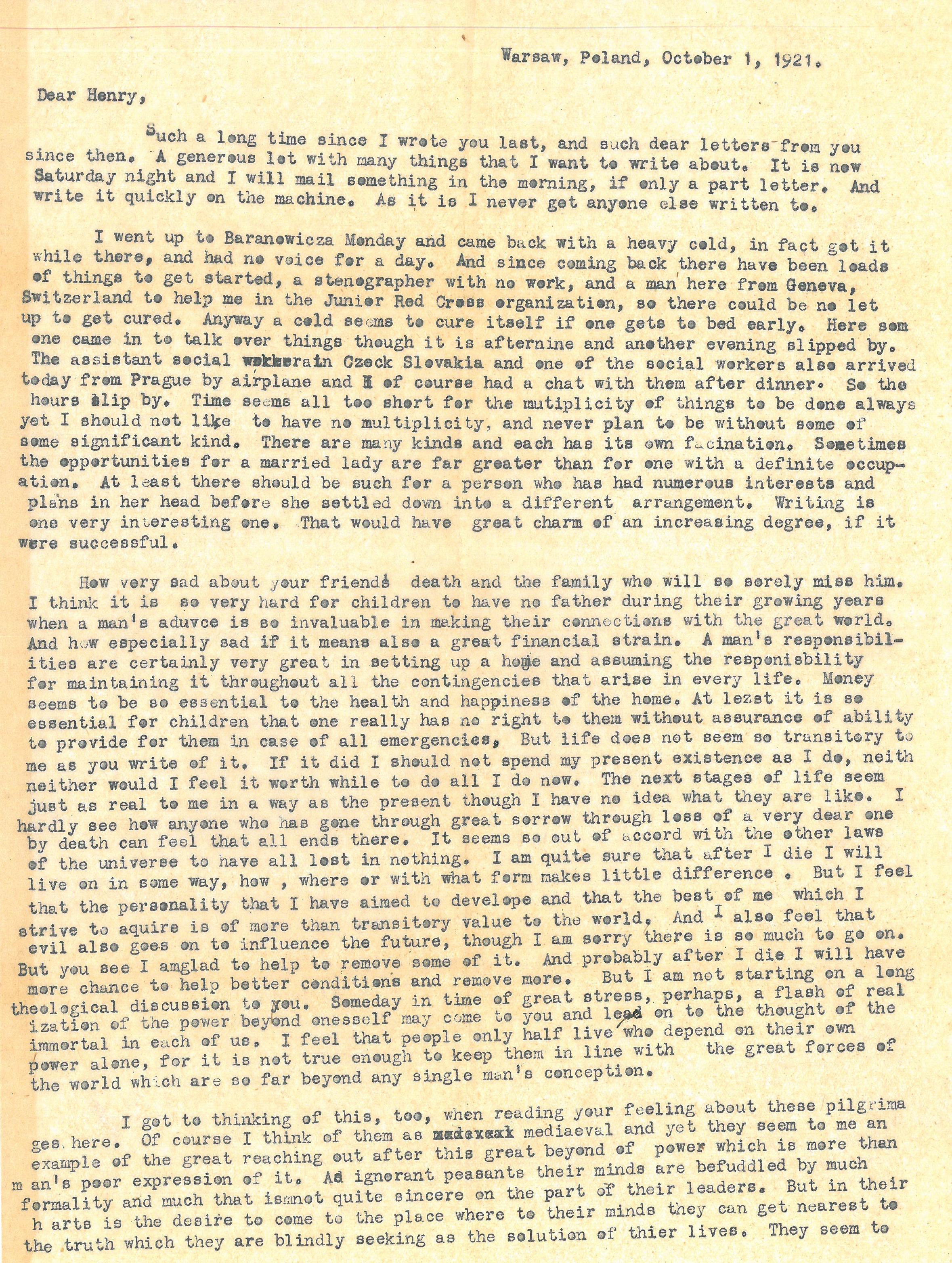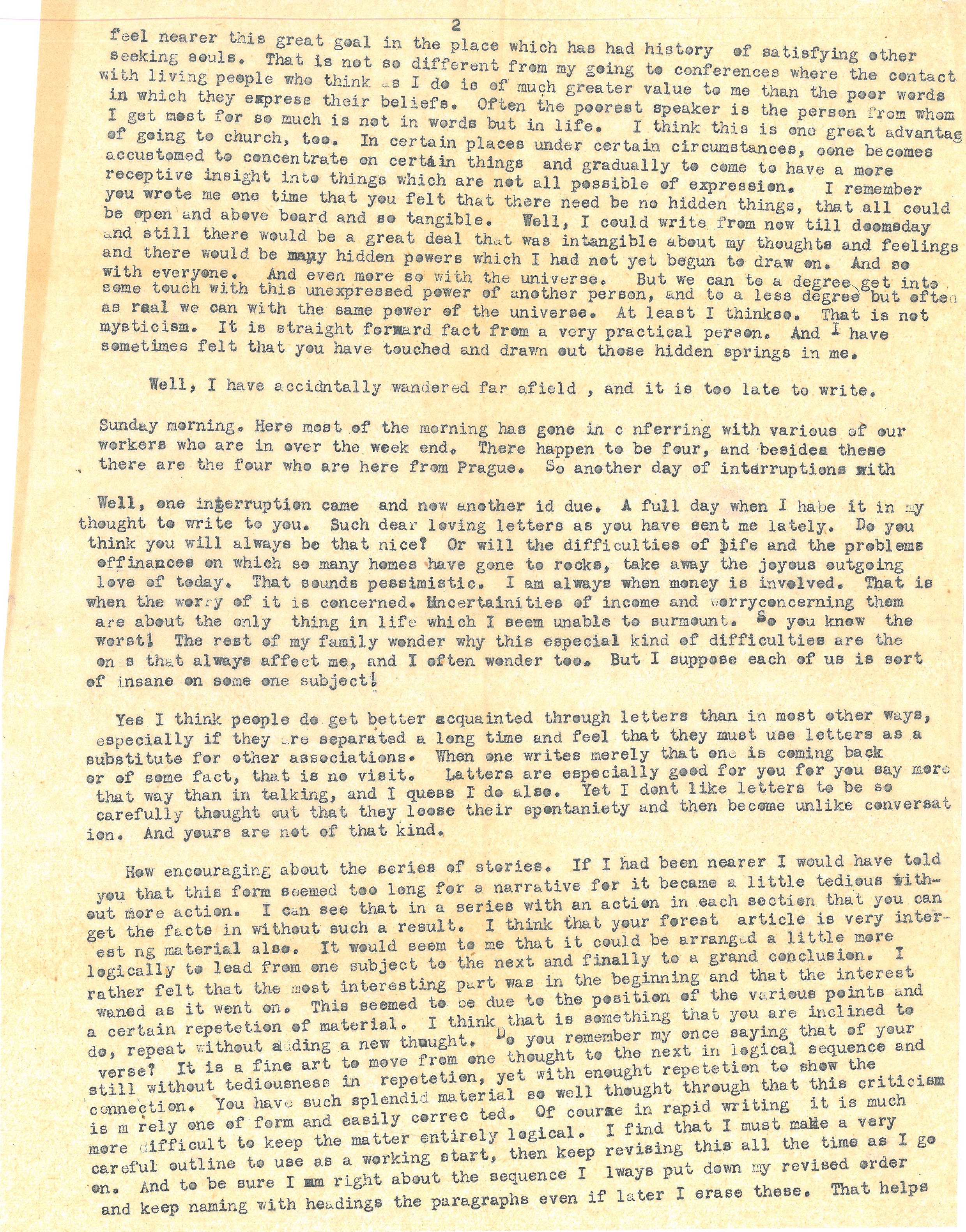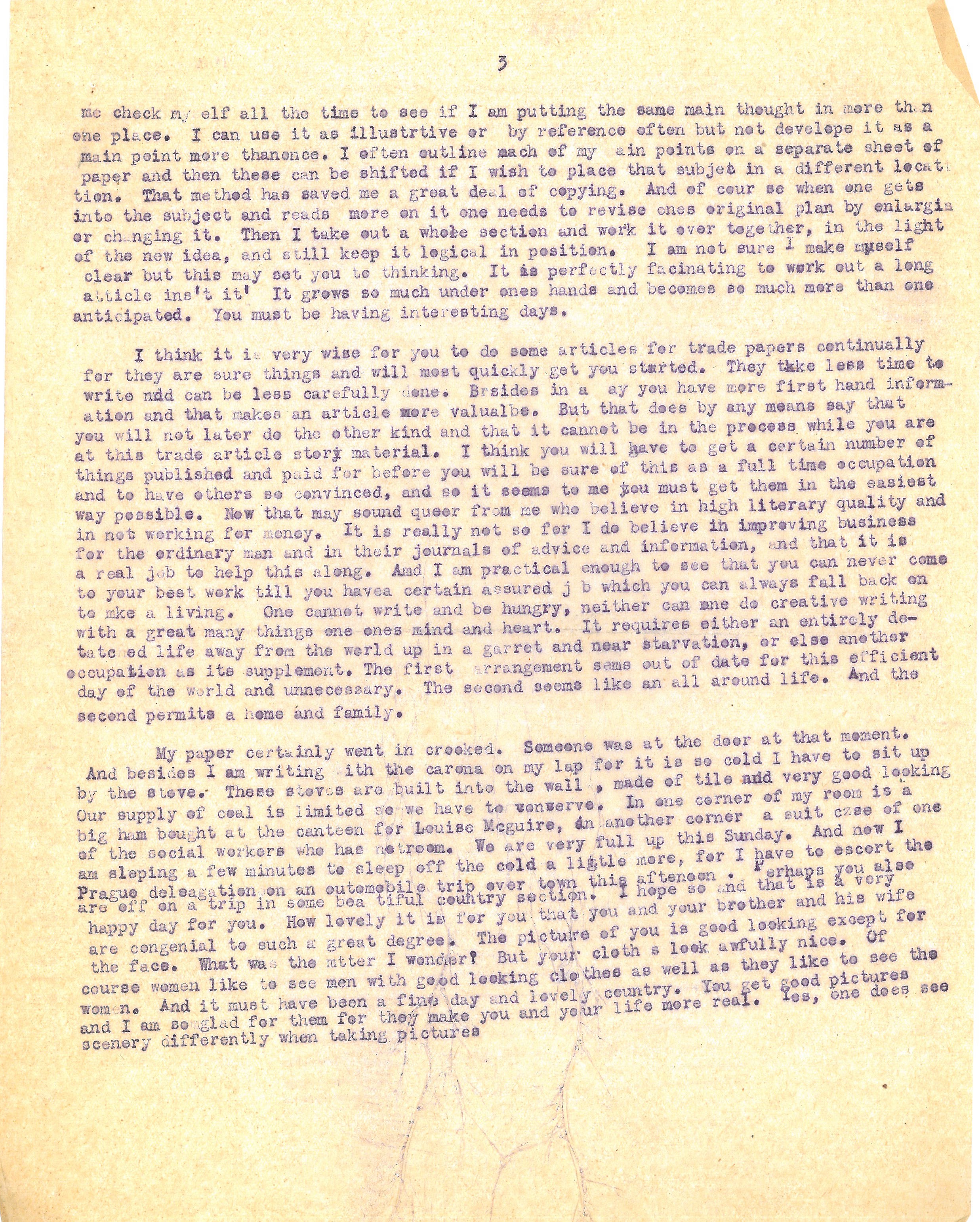From Hiram House to Warsaw: Evelina Belden Paulson’s Internationalist Extension of Social Work
Document 1: 22 August 1921 | Document 2: 8 September 1921
Document 3: 22 September 1921 | Document 4: 1 October 1921
Document 5: 4 October 1921 | Document 6: 2 December 1921
Bibliography
Author: Evelina Belden
Recipient: Henry Thomas Paulson
Date: 1 October 1921
Document Type: Typed Document
Location: Evelina Belden Paulson Papers, RG 30/406, Series II, Box 3, Letter No. 2182, O. C. A.
Introduction:
The following letter provides insight into the relationship between Evelina Belden and Henry Thomas Paulson. They met in 1914 as residents in the Chicago Commons Social Settlement, and a year after Belden wrote this letter, would be married on 16 October 1922. At this time, Paulson practiced law in Chicago. The egalitarian nature of their relationship is striking: in this letter, she explained better writing practices at length. Compared to other courtship correspondences of the time–a soldier overseas during the Great War writing home to his fiancé–their relationship is reversed.
Original Both Transcription
|
|
Transcription: Dear Henry, Such a long time since I wrote you last, and such dear letters from you since then. A generous lot with many things that I want to write about. It is now Saturday night and I will mail something in the morning, if only a part letter. And write it quickly on the machine. As it is I never get anyone else written to. I went up to Baranowicza Monday and came back with a heavy cold, in fact got it while there, and had no voice for a day. And since coming back there have been loads of things to get started, a stenographer with no work, and a man here from Geneva, Switzerland to help me in the Junoir Red Cross organization, so there could be no let up to get cured. Anyway a cold seems to cure itself if one gets to bed early. Here somone [sic] came in to talk over things though it is afternine [sic] and another evening slipped by. The assistant social worker in Czeck [sic] Slovakia and one of the social workesr also arrived today from Prague by airplane and I of course had a chat with them after dinner. So the hours slip by. Time seems all too short for the mutiplicty [sic] of things to be done always yet I should not like to have no multiplicity, and never plan to be without some of [sic] some significiant kind. THere are many kinds and each has its own facination [sic]. Sometimes the opportunities for a married lady are far greater than for one with a definite occupation. At least there should be such for a person who has had numerous interests and plans in her head before she settled down into a different arrangement. Writing is one very interesting one. That would have great charm of an increasing degree, if it were successful. How very sad about your friends [sic] death…I hardly see how anyone who has gone through great sorrow through loss of a very dear one by death can feel that all ends there. It seems so out of accord with the other laws of the universe to have all lost in nothing. I am quite sure that after I die I will live on in some way, how, where or with what form makes little difference. But I feel that the personality that I have aimed to develope [sic] and that the best of me which I strive to aquire [sic] is more than transitory value to the world. And I also feel that evil also goes on to influence the future, though I am sorry there is so much to go on. But you see I amglad [sic] to help to remove some of it. And probably after I die I will have more chance to help better conditions and remove more. But I am not starting on a long theological discussion to you. Someday in time of great stress, perhaps, a flash of realization of the power beyond onesself [sic] may come to you and lead on to the thought of the immortal in each of us. I feel that people only half live who depend on their own power alone, for it is not true enough to keep them in line with the great forces of the world which are so far beyond a single man’s conception.
I got to thinking of this, too, when reading your feeling about these pilgrimages here. Of course I think of them as xxxx mediaeval [sic] and yet them seem to me an example of the great reaching out after this great beyond of power which is more than man’s poor expression of it. Ad [sic] ignorant peasants their minds are befuddled by much formality and much that ismnot [sic] quite sincere on the part of their leaders. But in their h arts [hearts] is the desire to come to the place where to their minds they can get nearest to the truth which they are blindly seeking as the solution of their lives. They seem to feel nearer this great goal in the place which has had history of satisfying other seeking souls. That is not so different from my going to conferences where the contact with living people who think as I do is of much greater value to me than the poor words in which they express their beliefs. Often the poorest speaker is the person from whom I get most for so much is not in words but in life. I think this is one great advantag [sic] of going to church, too. In certain places under certain circumstances, oone [sic] becomes accustomed to concentrate on certain things and gradually to come to have a more receptive insight into things which are not all possible of expression. I remember you wrote me one time that you felt that there need be no hidden things, that all could be open and above board and so tangible. Well, I could write from now till doomsday and still there would be a great deal that was intangible about my thoughts and feelings and there would be many hidden powers which I had not yet begun to draw on. And so with everyone. And even more so with the universe. But we can to a degree get into some touch with this unexpressed power of another person, and to a less degree but often as real we can with the same power of the universe. At least I thinkso [sic]. That is not mysticism. It is straight forward [sic] fact from a very practical person. and I have sometimes felt that you have touched and drawn out those hidden springs in me. Well, I have accidentally wandered far afield, and it is too late to write.
Sunday morning. Here most of the morning has gone in c nferring [conferring] with various of our workers who are in over the week end [sic]. There happen to be four, and besides these there are the four who are here from Prague. So another day of interruptions with [sic] Well, one interruption came and now another id [sic] due. A full day when I habe [sic] it in my thought to write you. Such dear loving letters as you have sent me lately. Do you think you will always be that nice? Or will the difficulties of life and the problems offinances [sic] on which so many homes have gone to rocks, take away the joyous outgoing love of today. That sounds pessimistic. I am always when money is involved. That is when the worry of it is concerned. Uncertainities [sic] of income and worryconcerning [sic] them are about the only thing in life which I seem unable to surmount. So you know the worst! The rest of my family wonder why this especial [sic] kind of difficulties are the on s [ones] that always affect me, and I often wonder too. But I suppose each of us is sort of insane on some subject! Yes I think people do get better acquainted through letters than in most other ways, especially if they are separated a long time and feel that they must use letters as a substitute for other associations. When one writes merely that one is coming back or of some fact, that is no visit. Latters [sic] are especially good for you for you [sic] say more that way than in talking, and I quess [sic] I do also. Yet I dont like letters to be so carefully thought out that they loose [sic] their spontaniety [sic] and then become unlike conversation. And yours are not of that kind. How encouragin about the series of stories. If I had been nearer I would have told you that this form seemed too long for a narrative for it became a little tedious without more action. I can see that in a series with an action in each section that you can get the facts in without such a result. I think that your forest article is very interest ng [interesting] material also. It would seem to me that it could be arranged a little more logically to lead from one subject to the next and finally to a grand conclusion. I rather felt that the most interesting part was in the beginning and that the interest waned as it went on. This seemed to be due to the position of the various points and a certain repetetion [sic] of material. I think that is something that you are incline to do, repeat without adding a new thought. Do you remember my once saying that of your verse? It is a fine art to move from one thought to the next in logical sequence and still without tediousness in repetetion [sic], yet with enough repetetion [sic] to show the connection. You have such splendid material so well thought through that this criticism is m rely [merely] one of form and easily correc ted [sic]. Of course in rapid writing it is much more difficult to keep the matter entirely logical. I find that I must make a very careful outline to use as a working start, then keep revising this all the time as I go on. And to be sure I am right about the sequence I lways [always] put down my revised order and keep naming with headings the paragraphs even if later I erase these. That helps me check myself all the time to see if I am putting the same main thought in more than one place. I can use it as illustrtive [sic] or by reference often but not develope [sic] it as a main point more thanonce [sic]. I often outline each of my main points on a separate sheet of paper and then these can be shifted if I wish to place that subject in a different location. That method has saved me a great deal of copying. And of course when one gets into the subject and reads more on it one needs to revise ones original plan by enlargis [sic] or changing it. Then I take out a whole section and work it over together, in the light of the new idea, and still keep it logical in position. I am not sure I make myself clear but this may set you to thinking. It is perfectly fascinating to work out a long atticle [sic] isn’t it’ [sic] It grows so much under ones hands and becomes so much more than one anticipated. You must be having interesting days. I think it is very wise for you to do some articles for trade papers continually for they are sure things and will most quickly get you started. They take less time to write and can be less carefully done. Brsides [sic] in a ay [way] you have more first hand information and that makes an article more valuable. But that does by any means say that you will not later do the other kind and that it cannot be in the process while you are at this trade article story material. I think you will have to get a certain number of things published and paid for before you will be sure of this as a full time occupation and to have others so convinced, and so it seems to me you must get them in the easiest way possible. Now that may sound queer from me who believe [sic] in high literary quality and in not working for money. It is really not so for I do believe in improving business for the ordinary man and in their journals of advice and information, and that it is a real job to help this along. Amd [sic] I am practical enough to see that you can never come to your best work till you havea [sic] certian assured j b [job] which you can always fall back on with a great many things one ones [sic] mind and heart. It requires either an entirely detached life away from the world up in a garret and near starvation, or else another occupation as its supplement. The first arrangement sems [sic] out of date for this efficient day of the world and unncessary. The second seems like an all around life. And the second permits a home and family. My paper certainly went in crooked. Someone was at the door at that moment. And besides I am writing with the carona on my lap for it is so cold I have to sit up by the stove. These stoves are built into the wall, made of tile and very good looking [sic] Our supply of coal is limited so we have to conserve. In one corner of my room is a big ham bought at the canteen for Louise Mcguire, in another corner a suit czse [sic] of one of the social workers who has notroom [sic]. We are very full up this Sunday. And now I am sleping [sic] a few minutes to sleep off the cold a little more, for I have to escort the Prague deleagation [sic] on an outomobile [sic] trip over town this afternoon. Perhaps you also are off on a trip in some bea tiful [sic] country section. I hope so and that is a very happy day for you. How lovely it is for you that you and your brother and his wife are congenial to such a great degree. The picture of you is good looking except for the face. What was the mtter [sic] I wonder? But your cloth s [sic] look awfully nice. Of course women like to see men with good looking clothes as well as they like to see the women. And it must have been a fine day and lovely country. You get good pictures and I am so glad for them for they make you and your life more real. Yes, one does see scenery different when taking pictures [sic] |



